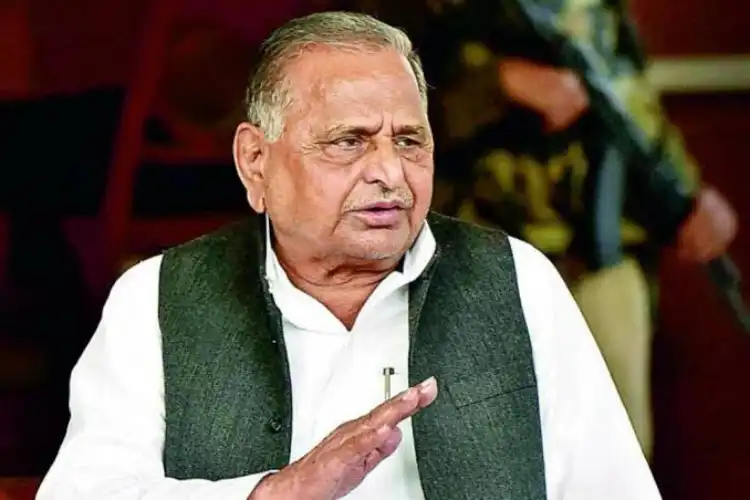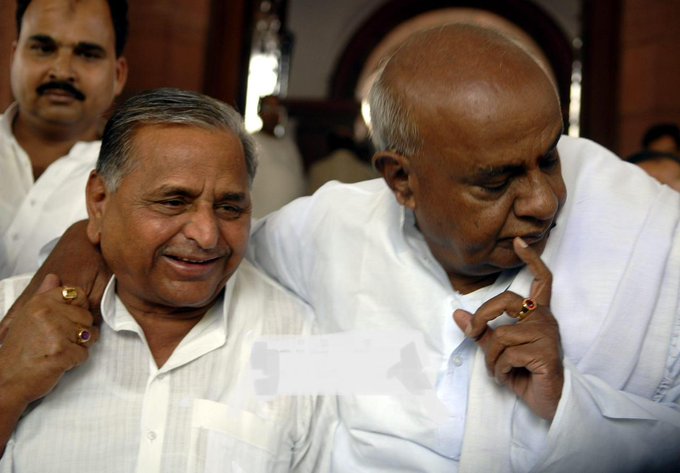
Shekhar Iyer
Mulayam Singh Yadav, 82, who passed away on October 10, rose to the pinnacle of Indian politics from a humble background. Undoubtedly, he crafted his own space and left a deep mark as a "Netaji" (leader) for countless followers of the Samajwadi Party (SP) he founded in October 1992.
Inspired by the ideals of his ideologue and Socialist veteran Ram Manohar Lohia, Mulayam did not hesitate to find partners and allies in seeking power.
Mulayam Singh-Obituary
The turning point in his political career was the demolition of the Babri Masjid in December 1992 and the aftermath of the events that followed and shook Indian politics.
His rise as a leader who was willing to charter a new course in the cause of the backward castes and for amity with the Muslim community changed equations among the communities forever. Mulayam helped in forging a strong Muslim-Yadav combination, which made it one of the strongest alliances between communities in India in election after election.
Mulayam had the uncanny ability to connect his workers across UP. Before Mulayam was accused of promoting nepotism, he was known to encourage local leaders of Muslims, backward and most backward castes to make a foray into electoral politics. Mulayam withdrew cases against dacoit Phoolan Devi in 1995 and made her a mascot of the Nishad community by giving her a Lok Sabha ticket.
In his first two terms as CM, Mulayam made his mark by improving governance in rural parts of UP-- building roads in villages and ensuring free water for irrigation.
At one time, he was one of the faces of the anti-Congress movement that characterised Indian politics in the 1970s and 1980s.
 Mulayam Singh Yadav with former Prime Minister H D Devegowda
Mulayam Singh Yadav with former Prime Minister H D Devegowda
Among his notable acts was his opposition to Sonia Gandhi and stopping her from becoming prime minister due to her foreign origin when Atal Bihari Vajpayee lost the trust vote by a solitary vote in 1999.
That act endeared him to the BJP, which developed a soft corner for him. However, in 2007, when the Left parties withdrew support from the United Progressive Alliance (UPA) led Prime Minister Manmohan Singh on the issue of the Indo-US nuclear deal, he stood by the Congress government and gave it a fresh lease of life.
Mulayam served three times as chief minister of Uttar Pradesh (1989–91, 1993–95, and 2003–07). He was a 10-time MLA and seven-time MP.
Mulayam's political dexterity surprised friends and rivals alike
His saga of becoming CM thrice itself is a story of his political dexterity. Mulayam became Chief Minister of Uttar Pradesh for the first time in 1989. After the collapse of VP Singh-led National Front government in November 1990, he joined Chandra Shekhar's Janata Dal (Socialist) party and continued in office as CM with the support of the Congress. However, his government fell when Congress withdrew its support in April 1991after it had withdrawn its support for Chandra Shekhar's government. The mid-term elections to the Uttar Pradesh assembly were held in mid-1991 and Mulayam lost power to the BJP. One of the reasons was attributed to the police action on the kar sevaks at the peak of the Ram Janmabhoomi movement in 1990.
Mulayam formed the Samajwadi Party in 1992. In 1994, he allied with the Bahujan Samaj Party and became CM. But by 1995, the SP-BSP relationship soured because Mayawati was against him. Mayawati accused Mulayam of attempting to burn her to death by a riotous mob. Of course, Mayawati put the incident behind her back later when she aligned with Mulayam's son, Akhilesh Yadav, in the 2019 Lok Sabha polls.
In 2002, the BJP and the BSP joined hands to form a government under Mayawati. But the BJP pulled out of the government in 2003. Encouraged by the BJP, BSP rebel legislators backed Mulayam to become CM with the support of independents and small parties. He was a Lok Sabha MP then and later contested the Gunnaur assembly seat in January 2004 to remain CM.
Mulayam contested the 2004 Lok Sabha elections from Mainpuri as CM. He won the seat and his Samajwadi Party too won a good number of Lok Sabha seats. Sonia Gandhi steered Congress to form a coalition with the support of the Left parties. Mulayam resigned from his Lok Sabha seat and remained CM until the 2007 elections, which were won by the BSP, and Mayawati became CM.
In 2012, the SP won an outright majority in the assembly elections. Mulayam retained his leadership of
the party, but he allowed his son, Akhilesh Yadav, to become CM.
Mulayam never stopped surprising his friends and foes alike. Ahead of the 2019 general elections, during his intervention in the Lok Sabha during the Budget session of Parliament, Mulayam created a flutter by wishing that Narendra Modi should become PM again. He claimed that Modi had done good work and nobody could raise a finger against him. As he made this remark, Congress President Sonia Gandhi was seen sitting beside him.
Mulayam showed that his way up in politics was due to his ability to befriend many across the political spectrum and prove himself as unpredictable as ever --but firmly adhering to his belief in speaking up for the downtrodden. Though he turned many enemies into friends, his relationship with one leader, Mayawati, however, remained unaltered since 1995 when the Samajwadi Party-Bahujan Samaj Party alliance broke with the infamous Lucknow State Guest House incident.
He never really apologised for the assault allegedly carried out by SP workers on Mayawati.
Despite his varied experience, Mulayam missed the post of prime minister. In 1996, Mulayam won a seat in the Lok Sabha and came close to becoming the PM. But he found himself upstaged by Janata Dal (Secular) leader H D Deve Gowda who was preferred by other partners to be PM of a coalition arrangement, which was supported by the Congress from outside.
Gowda emerged as the consensus candidate of the United Front (UF) coalition government (of which SP was a member). Later, Mulayam agreed to become the defence minister of the UF government. It was also the occasion that was described later by late West Bengal Chief Minister Jyoti Basu as a "historic" blunder by the CPI(M) for not letting him become PM as he was considered the first choice of the UF leaders for the high post.
On the downside, Mulayam was seen as one who was unfazed in promoting his family in politics. At any given time, Mulayam ensured that there were more than 10 family members in electoral politics.
Mulayam was no stranger to controversies even when he served as CM. His stand against separate statehood for Uttarakhand, apart from his strong line against the Ram temple movement, saw him in the line of fire of his opponents.
Mulayam valued his friends deeply. Among them, Beni Prasad Varma, Azam Khan, Mohan Singh, and Janeshwar Mishra stood and preceded the late Amar Singh who managed to outclass all of them and encouraged Mulayam to seek a national role.
ALSO READ: Politics through Prime Ministers' and not just political parties - 1
The entry of Amar Singh into Mulayam's life brought about a sea change in his dealings as the former brought in a corporate style to "Netaji." This alienated several other senior leaders and finally caused a rift within the family until his son, Akhilesh, ensured Amar Singh's exit.
In his sunset years, Mulayam was disturbed by the happenings in his family. His daughter-in-law Aparna (who is married to his son Prateek) joined the BJP. Akhilesh and his brother Shivpal parted ways. The demise of his second wife Sadhana Gupta Yadav (Prateek's mother) in July this year left Mulayam in sorrow.
